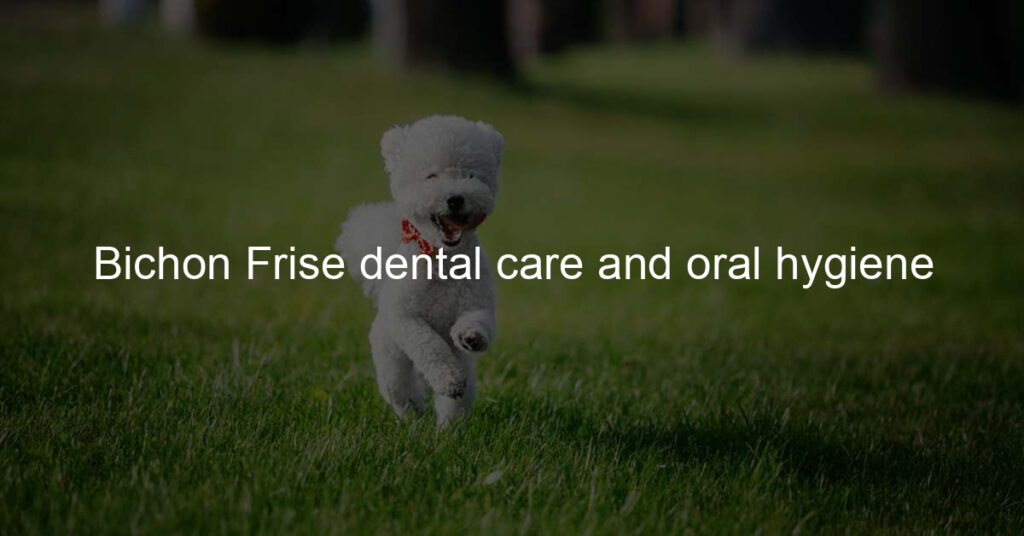Do you own a Bichon Frise? If so, then it’s important to prioritize your pup’s oral hygiene and establish a dental care routine to keep their teeth in top condition. These fluffy little pups require special attention when it comes to caring for their smiles – after all, poor dental health can cause an array of issues and could lead to more serious problems down the line.
But don’t worry! We’ve put together this comprehensive guide with everything you need to know about setting up a well-rounded dental care plan for your beloved Bichon Frise. In this blog post, we’ll walk through the essentials including brushing techniques, diet tips, and frequent vet visits that will help ensure your pooch stays happy and healthy for years to come!
Are Bichons prone to dental problems?
It is important to take into consideration the potential for dental problems in any type of dog, and a Bichon Frise is no exception. Bichons are known for their happy and often playful disposition, but it is important not to forget that these companion dogs still require supplemental care when it comes to teeth maintenance.
Proper teeth brushing and preventative check-ups with a veterinarian can go a long way toward managing dental problems before they become serious. Regularly checking their teeth, gums and overall oral health can help your furry friend stay healthy and smile with confidence.
How do you clean a Bichon Fris’s teeth?
Proper dental care for Bichon Frises is a necessary part of caring for the breed, and regular brushing is essential for maintaining good oral hygiene.
To clean your pup’s teeth, you should use a special toothbrush that’s specifically designed for small dogs such as a Bichon Frise; it should be small enough to fit comfortably in their mouth. The bristles should be soft to avoid irritation or damage to their teeth or gums. As you brush their teeth, use circular motions with dog-approved toothpaste and focus on the area directly around each tooth.
This extra care can help stave off gum disease, bad breath, pain, and other health issues related to poor hygiene.
How often should you brush a Bichon Frise’s teeth?
Taking care of your Bichon Frise’s teeth is an essential part of their health and well-being. It is recommended that you brush their teeth at least once a week, but preferably every day if you can.
Begin by lightly brushing the outside of their teeth with a small, soft-bristled toothbrush using pet toothpaste formulated specifically for cats and dogs. Make sure that as you brush, you focus particularly on the area where the teeth meet the gums to help prevent plaque buildup. If you take good care of your pup’s dental hygiene now, they will have years of healthy smiles ahead!
At what age do Bichons lose their teeth?
Bichons are known for their beautiful, fluffy white fur and their cheerful demeanor. They make excellent pets for both young and old alike due to their gentle dispositions. However, one thing that all Bichon owners may want to consider is the age at which their pooch will lose all of its teeth.
Generally speaking, Bichons will start to lose some of their teeth between four and six years of age; by eight years of age, most, if not all, of their teeth will likely be gone!
As such, Bichon lovers need to keep this in mind and begin preparing for the expenses involved with switching to a toothless diet plan at an early age. With proper foresight and care, your beloved pup can easily transition from having lots of teeth to none without any major issues.
Is there a natural way to clean dogs’ teeth?
It’s important to take good care of our furry friends and while brushing a dog’s teeth sounds like a tricky affair, it is one of the most recommended ways to keep their oral hygiene good. Nevertheless, there are other methods of cleaning a dog’s teeth without using a toothbrush – natural methods that have been proven to be effective.
For instance, incorporating fruits and vegetables into your pet’s diet such as carrots and apples is known for its ability to help clean plaque buildup from your pup’s teeth. Natural fibers like green beans or potatoes can also work wonders in this regard as they act like floss and will dislodge any bits that get stuck in between teeth and gums.
Incorporating these methods into your regular dog dental hygiene routine will not only be easy for you but also comfortable for your pup!
Closing Thoughts: Bichon Frise dental care and oral hygiene
Our overall conclusion is that dental care is of the utmost importance for Bichon Frise owners. Neglecting oral hygiene can result in significant dental health issues and will eventually affect the overall quality of life a Bichon Frise enjoys.
By strictly adhering to a consistent, daily dental routine and monitoring any changes in your dog’s mouth, you can significantly reduce the chance of serious heart, kidney, and respiratory complications. Regular visits with a vet for screenings and cleanings help ensure that any issues are detected early and treated promptly.
With disciplined attention to proper dietary habits and appropriate dental care, Bichon Frises can live long and healthy lives with excellent oral health.








